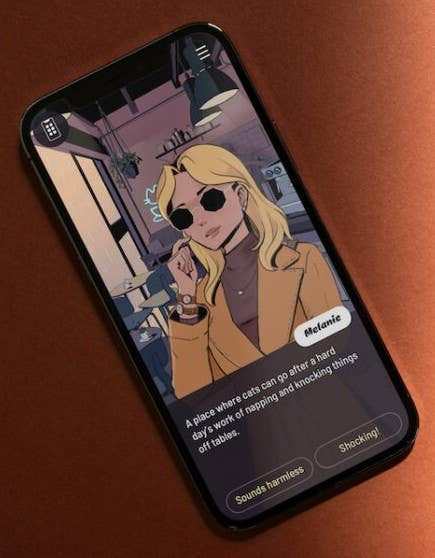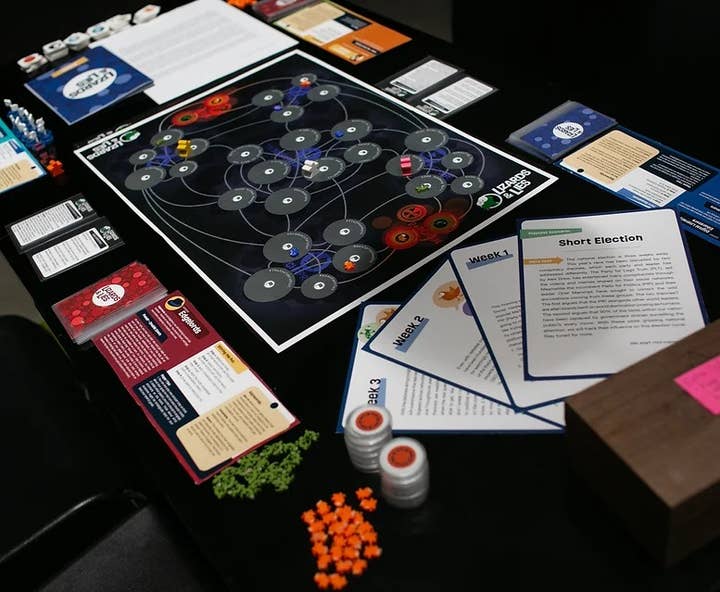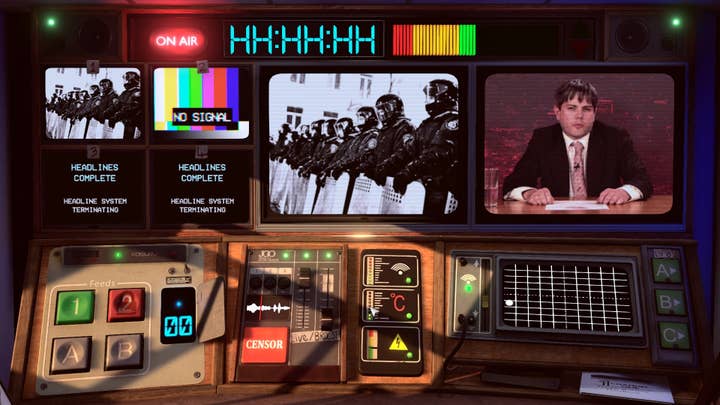Games tackle the villainy of propaganda
We speak to the studios teaching people how to identify disinformation by letting them spread it within video games
Sign up for the GI Daily here to get the biggest news straight to your inbox
It's been more than three years since the initial release of the outstanding satire Not For Broadcast, by publisher TinyBuild. Now, the FMV game is receiving a DLC pack, called Live and Spooky, as well as the release of a VR version. Both are set to arrive at the end of March.
Not For Broadcast is one of those rare achievements – a game that manages to pose difficult political questions while making its players laugh. Set in a 1980s British TV newsroom during the alternate timeline rule of an extremist government, it's a plate-spinning game in which players must edit and censor news clips, with a view to growing ratings and manipulating the world outside.
Players can create a narrative that supports the populist policies of the government, effectively acting as a propaganda tool. They can spin content in such a way that alters the meaning and context of interviews.
The early access release was warmly received by critics after its launch in early 2020, but developer NotGames' ongoing release plan was badly affected by the outbreak of COVID. As an FMV game, its cast of actors were unable to work remotely, and could not return to filming new episodes until after lockdown. Still, three years on – and in the context of revelations about Fox News' blatant disinformation campaign following the last U.S. presidential election – the new updates feel timely.

This is also a time when we're seeing more games that tackle disinformation, often in much the same way as Not For Broadcast: through satire and the practice of media manipulation. Last year, Tilt Games released Cat Park, the latest in its series of games about social media manipulation. Cat Park is sponsored by the U.S. Department of State, and is specifically designed to teach players how disinformation works and how to spot fake news.
Tilt's previous game, Harmony Square, was the tale of a small town divided through the evil manipulations of the player, who sought to sow disunity and chaos through lies. A Cambridge University study of the game's players found that they were better able to identify fake news in the real world, having enjoyed the experience of sowing lies in a narrative game.
Meanwhile, a forthcoming seminar for military cadets from multiple countries will feature the board game Lizards and Lies, in which players try to dominate social media spaces through either spreading conspiracy theories, or fact-checking them, and pushing back against the lies. Games, it seems, are getting better at simulating dissimulation.
"We put players in the shoes of powerful news people, and ask them to make morally questionable choices," says Alex Nichiporchik, CEO of TinyBuild. "The most important thing for us is that the game is fun, but players come away understanding how news media manipulates cuts and edits to fit an agenda. That's very empowering."
"When you subject a player to disinformation tactics, they become more able to recognize them in real life"
Lisa Poot, Tilt Games
Part of Not For Broadcast's charm is its insistence on revealing just how the sausage is made in the TV news business. "When I played the prototype, I found it fascinating," says Nichiporchik. "I saw all the components of news broadcasting, and how it works.
"I'm a strong believer that players are interested in how things are made in the world, and they enjoy engaging in that. We work on a lot of physics-based games which teach people how things work, and that introduce players to new things. When we play a game like SimCity, we enjoy building cities and we also learn how urban zoning works. But it's the entertainment value that has to come first."
Nichiporchik is keen to stress that the game is designed to give players difficult moral choices, with censorship and propaganda a useful canvas. He compares the game to Papers, Please, in which players take on the role of a border guard for a repressive regime, who must strike a balance between doing what is morally right, and doing what is necessary for his own survival.
Other games though are more interested in investing players with purely evil motives, both as a way to entertain, and as an educational tool. Cat Park was paid for by the U.S. Department of State to counter disinformation, most especially when it's used as a recruitment tool for extremist organizations.
Players take on the role of a newly installed resident of an urban apartment, who finds themselves lured into a campaign against the building of a nearby park for cats. The player meets other campaigners, each of whom is skilled at a specific disinformation tool, such as using emotive language in social media posts, manipulating images, and leveraging the hottest memes.
As the player hones their skills and helps the fight against the cat park, they begin to understand that their cause may be the plaything of nefarious forces.
"The purpose of the game is to increase people's media literacy," says Lisa Poot, senior project manager at Tilt Games. "We're not trying to say what is true and what is not true – only to show how misinformation works, how disinformation spreads, and how it can have harmful consequences. By getting involved in this conspiracy, and learning the tricks used by conspiracy theorists, players are better able to recognize those tactics in the real world."
Tilt's games are all based on inoculation theory, which states that "people's minds can be inoculated, just like their bodies," according to Poot. Games are discreet experiences that work like vaccines.

"When you subject a player to disinformation tactics, they become more able to recognize them when they encounter them in real life," she adds. Tilt's games are available for free, and are used by educators to teach media literacy. They reach hundreds of thousands of players a year.
Scott DeJong, creator of Lizards and Lies, has published a study of dozens of games that seek to tackle disinformation. Like Cat Park, many of these games are short, free and available online. He says the use of games to fight conspiracy theories is even more important because conspiracy recruitment often uses gamification techniques.
"Disinformation and conspiracy theory processes are often like puzzles," he says. "They draw people in by seeming to ask questions, while really directing the target towards a specific answer. Q [the originator of QAnon] drops information that feels like a puzzle that the community works together to interpret and resolve. The community is highly motivated by metrics, like numbers of new followers, like scores in a game."
DeJong says games that tackle disinformation are likely to improve the players' ability to process conspiracy theories in real life.
"Games are great tools for asking questions. It's fine to try to tell people to seek out the source material behind the stories they read online, but the average person doesn't do that. Games about disinformation create spaces where there is a heavy focus on being critical about social media, and a reward for demonstrating an understanding of how disinformation works."
Sign up for the GI Daily here to get the biggest news straight to your inbox
